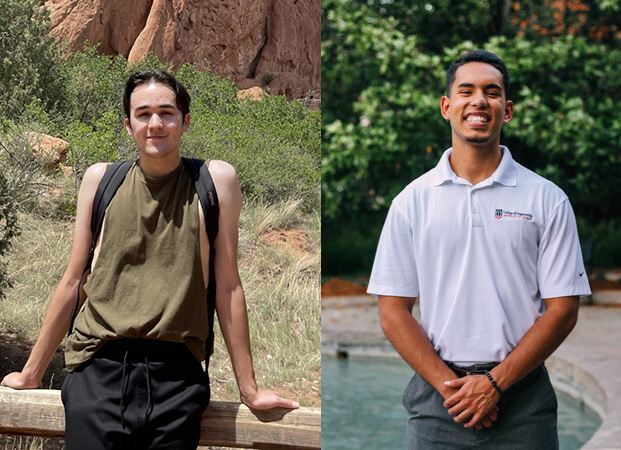Two current University of Georgia undergraduate students are among the 10 campus recipients of 2023 National Science Foundation Graduate Research Fellowships.
The NSF Graduate Research Fellowship Program helps ensure the quality, vitality and diversity of the scientific and engineering workforce of the United States. The program recognizes and supports outstanding graduate students who are pursuing full-time research-based master’s and doctoral degrees in science, technology, engineering and mathematics (STEM) or in STEM education. The GRFP provides three years of support at $37,000 annually over a five-year fellowship period for the graduate education of individuals who have demonstrated their potential for significant research achievements in STEM or STEM education.
Begun in 1952, this fellowship program is the oldest and most prestigious of its kind; 42 recipients have gone on to become Nobel laureates, and more than 450 have become members of the National Academy of Sciences.
Typically, there are over 12,000 applications for these fellowships annually. This year, there were 2,552 students offered fellowships in all areas of science.
The UGA undergraduate students and alumni winners are:
- Shay Magahey, B.S. ’22 (Climate and Large-Scale Atmospheric Dynamics)
- Killian McSweeney, (Climate and Large-Scale Atmospheric Dynamics)
- Carolina Victoria Del Mar Melendez Declet, B.S. Biology ’22 (Marine Biology)
- Andres E Villalobos, (Developmental Biology)
- Julia Nicole Weil, B.S. Ecology ’22 (Organismal Biology)
“Andres is a phenomenal student scholar with exceptional promise,” said Rachel Roberts-Galbraith, assistant professor in the Franklin College of Arts and Sciences department of cellular biology. “In our group, he has made exciting contributions to our goal of understanding how small signaling molecules called neuropeptides promote tissue regeneration and stem cell function. As his mentor, it has been very rewarding to be part of his journey.”
Magahey and McSweeney join seven other NSF GRF winners nationally in the category of Geosciences – Climate and Large-Scale Atmospheric Dynamics. The undergraduate institutions of the other seven winners were Cornell, Harvard, Princeton and Yale Universities, UC-Berkeley, Rochester Institute of Technology and Worcester Polytechnic Institute. UGA was the only institution with two winners in this category.
“Shay and Killian are two of the best students I’ve taught in 22 years at UGA, and the best at UGA are as good as the best, anywhere,” said John Knox, Josiah Meigs Distinguished Teaching Professor in the Franklin College department of geography. He is also the undergraduate coordinator for the Atmospheric Sciences Program, and a recipient of this fellowship as an undergraduate in 1988. “This august company among the top Ivy League schools indicates just how ‘high above the rim’ the undergraduates in our atmospheric sciences program and geography department are playing.”
Magahey and McSweeney have each been involved in research through CURO. McSweeney was first author on a paper based on his undergraduate thesis work published in January in Geophysical Research Letters, a major atmospheric science journal.
“Killian and Shay are both self-motivated, independent, and extremely capable researchers. I’m thrilled that their achievements and ideas have been recognized with this fellowship award,” said Gabriel Kooperman, assistant professor in the department of geography. “I’ve been so fortunate to have had the opportunity to work with them on research for the last few years and I know they will go on to great success in graduate school.”
Five UGA graduate students are also 2023 Fellowship winners:
- Natalie Marie Gonzalez, (Evolutionary Biology)
- Vanessa Amurao Gremler, (Ecology)
- Matthew J Pierce, (Ecology)
- Kevin Christopher Riedmuller, (Microbial Biology)
- Julia Gul’zira Sharapi, (Ecology)








